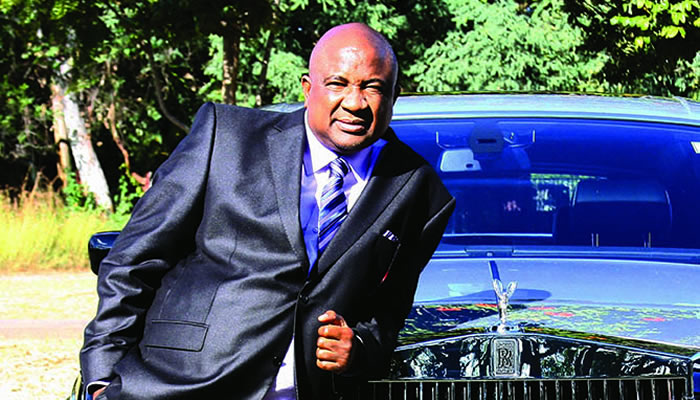By Concern Mbira
In my previous article entitled, ’Rich Kids of Instagram’, Sidney Hambira’s lifestyle was compared with the sobering reality that the majority of Zimbabweans will never have the opportunity to escape the idleness and captivity of poverty.

Several comments made by the public in the previous article disagreed with the analysis that Sidney’s lifestyle was unwarranted, suggesting he had every right to live the good life.
If there was nothing to hide then why did Sidney block his Instagram account after the article was released?
Extravagance in the form of a $5,000 dollar pair of sneakers is immoral in a country where two thirds of the population will never earn the amount of money that Sidney pays for a single pair of sneakers.
Sidney Hambira is just one of many individuals who have no problem flaunting their questionably ill-gotten wealth. The crude lifestyle of the local elite shows how detached they have become from the impoverishment facing their own people.

The materialistic lifestyle of the local elite has unfortunately become the benchmark of success for the rich and poor in Zimbabwe.
Professor William Gumede of the University of Witwaterstrand has drawn parallels between the lifestyle of Africa’s post independent elite and the lives of their former colonial counterparts. He argues that today the indigenous elite has fallen into the same pattern of extravagance and immorality.
“Before independence, the small colonial elite lived lives of conspicuous consumption: expensive mansions and shopping trips in the capital cities of colonial empires, and lavish parties.
“A culture of hard work was often absent. Many of the post-independence African elite took the colonial elite’s conspicuous consumption standard as a benchmark for ‘success’.
Not surprisingly, the poor people also wanted to emulate this ‘bling’ lifestyle. Such excessively lavish and wasteful ‘bling’ lifestyles enjoyed by a small elite provided fertile ground for consumption.”
In the past decade, traditional measures of growth such as GDP or income per capita have been complimented by a new set of alternative measures focused on prosperity and happiness.
The Legatum Institute prosperity index measures global health and well-being. It is relevant to 142 nations’ and considers 89 indicators spanning eight categories including education, health, government and economics.
The prosperity index found the happiest and most prosperous countries in 2014 were Norway, Switzerland and New Zealand.
They all enjoy a high degree of personal and political freedom, high GDP per capita incomes (standard of living), and high levels of trust between government and citizens.
Norway has come first three years in a row, according to Forbes. A resounding 74 per cent of Norwegians claimed they trust their government and fellow citizens.
Between 2009 and 2011, Zimbabwe ranked alongside the least prosperous countries on earth including Haiti, Afghanistan and the Central African Republic. Zimbabwe was the least prosperous country according to the index in 2011, followed by Pakistan.
It would be unfair to say the picture today is no different than it was several years ago. Zimbabwe’s prosperity has risen according to the prosperity index and it now ranks among the top ten most improved countries in health in Sub-Saharan Africa.
Despite these relative improvements in health and infrastructure there still remain considerable obstacles to prosperity. Trust between citizens and government has broken down because local authorities cannot deliver adequate services to communities.
The same politicians’ who blame western sanctions for Zimbabwe’s economic problems, jet set across the world purchasing expensive brands and luxury designer clothes.
The extravagant lifestyle of the ‘less than one percent’ of rich Zimbabweans reflects a new set of principles adopted by the indigenous African elite who are deeply embedded in the global neo-liberal order.
Thirty-five years ago, the liberation hero’s founded Zimbabwe on the principles’ of solidarity, egalitarianism and empowerment. Why did Ambuya Nehanda or Josiah Tongogara fight and die for Zimbabwe?
So Sidney Hambira could import a five thousand dollar pair of shoes from Italy? So Chiyangwa could entertain himself with an abominate transformer limousine?

These individuals spend huge sums of money with no real purpose or concept of public good.
We used to have a clear sense of who we were and where we were going. We had faith in our government, but as this faded, along with the integrity of our leaders, so did our happiness.
We have been trying to fill the void with materialism and consumption. The self – interested individualism at the heart of Zimbabwe is leading to the abandonment of its own indigenous culture and value system.
John Ralston, a Canadian political philosopher once said, “The Enlightenment theory of happiness was an expression of public good or the public welfare, of the contentment of the people.”
The World Happiness Database, compiled by Ruut Veenhoven of the Erasmus University Rotterdam and Happiness Economics Research Organization, determined Zimbabweans had some of the lowest levels of satisfaction with their lives, the lowest perceived realization of wants, and the worst balance of pleasant and unpleasant affects.
If the leaders of the future wish for Zimbabwe to be a happy nation, they will have to re build the nation’s identity and regenerate trust and social equity.
We demand that the next crop of leaders promote a healthy balance in society that provides every woman and man with the chance to shape his or her destiny and contribute to the common good.
Zimbabwe was founded on the principles of fairness and freedom. This should be the focus for the next generation of leaders who are fast approaching on the horizon.






